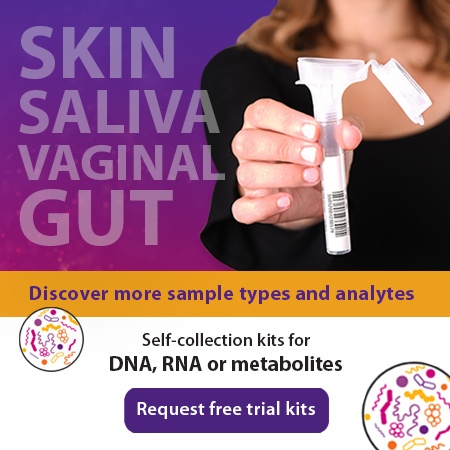2021-02-11
“Crohn’s disease and Colitis collectively are inflammatory bowel diseases (IBD). These inflammatory diseases impact the gastrointestinal tract (although not exclusively gastrointestinal tract). Most of these diseases can have an autoimmune component, particularly Crohn’s disease. Crohn’s disease can affect any part of the gastrointestinal tract anywhere from the mouth to the anus, and Colitis principally affects the lower gastrointestinal tract, colon and rectum.” – Dr. Honig.
In December 2020, Diversigen and DNA Genotek hosted a live discussion panel moderated by Andrea Hardy from Ignite Nutrition entitled Crohn’s and Colitis: microbiome biomarkers, diet, and the environment with three experts: Dr. Gerard Honig, Associate Director of Research Innovation at the Crohn’s and Colitis Foundation, Dr. Alison Zang, Postdoctoral Scholar at Stanford University, and Dr. Kevin Litcofsky, Director of Molecular Technologies at Seres Therapeutics. The panel discussed challenges of IBD from patient diagnosis to treatment, along with multiomic approaches to better understand novel therapeutics. In this blog, we will highlight some of the key themes discussed during the live panel. If you are interested in watching the full discussion, the video is below.
Gut microbiome research has opened doors to improved IBD diagnosis and treatment. With better understanding of IBD, new methods for non-invasive diagnostic tools, therapeutic lifestyles, and dietary interventions are being found and leading to a higher quality of treatment.
Dr. Gerard Honig started by explaining how there are multiple types of approved therapies for the treatment of IBD, which include invasive surgery. The need for surgery can increase if the disease is not properly monitored and detected early.
“There are changes in the gut microbiome which are present relatively early in the disease. To treat patients earlier and better the gut microbiome may have diagnostic biomarkers, monitoring biomarkers, or prognostic biomarkers which could indicate patients likely of developing IBD and in some cases severe or aggressive versions. Monitoring these microbiome biomarkers could also predict in advance which patients are most likely to respond to a particular therapy. ”- Dr. Honig.
Related article: Collect and stabilize gut microbiota samples from IBD patients undergoing dysbiosis
Therapeutics and IBD
As Dr. Honig explained above, the gut microbiome can open doors to better treatment and therapeutics for IBD. Dr. Kevin Litcofsky discussed work his team at Seres Therapeutics has been doing on microbiome therapeutics for Ulcerative Colitis (UC) and the gut microbiome. Seres Therapeutics currently has two therapies in development for UC: SER-287 and SER-301 microbiome therapeutics.
“SER-287 is a biologically sourced product which means we purify the Firmicutes bacteria from stool and formulate it for delivery. Assaying the gut microbiome we’ve been able to focus on the bacteria we believe provide the most beneficial effect on the disease. This allows us to inactive or clear pathogens and optimize the pharmaceutical properties of the strain.”- Dr. Litcofsk
Rationally designing a microbiome therapeutic requires an understanding of data generation and its limitations. Dr. Litcofsky discusses how Seres Therapeutics is collaborating with partners to improve the assay characterization to get more out of samples and data.
“My role in this work is to help understand how we generate this sort of data to inform these learnings and how we understand the limits of data collection. In close collaboration with partners such as Diversigen, we have worked for years now to characterize our assays starting with sample collection and storage to understanding the impact that has on the results and the conclusions we can draw from the assays. We have also tried to maximize what we can learn from the patients that are taking part in these studies and from each sample. This is where we have been able to look at ways to do multiple assays for each type of sample that we collect using DNA Genotek’s sample collection solutions.” - Dr. Litcofsky
Role of the environment and IBD
Dr. Alison Zhang focuses her research on the human exposome, and she explained how the human exposome can give us information to understanding how environment plays a role in IBD. She described how they looked at environmental research collected at weather stations from a general geographic location which would supply data on the concentration of gases, temperature, and humidity data. However, individuals in the same general geographic location would be affected differently by the same air exposure; therefore, you must focus on the individual level.
Looking at an individual's exposure to the chemicals in the air and their microbes using metagenomic sequencing, Dr. Zhang explained that there are interactions between the two which can affect human health, including IBD.
“We want to associate how the external exposures affect human health by correlating the external environment with the internal environment (gut microbes).” - Dr. Zhang
Dr. Zhang explained that it is still too early to know which environmental factors are most prominently associated with flares and IBD. However, other external factors, such as diet, currently have several control trials and observational studies related to dietary triggers and IBD according to Dr. Honig.
“From previous literature, smoking and diet is one of the top triggers [for IBD].” - Dr. Zhang.
According to both Dr. Honig and Dr. Zhang, research about the relationship between the environment and the gut microbiome for IBD is still in its infancy. Dr. Zhang’s research focuses on air exposure and the Crohn’s and Colitis Foundation is supporting research on other environmental exposures, such as psychological stress. [1]
“Environmental factors in the role of inflammatory bowel disease are a major focus for [the Crohn’s and Colitis foundation’s] funding efforts... The study of environmental factors increase learning not just in IBD, but in a number of inflammatory chronic variations through factors like stress, psychological stress, and perceived psychological stress.” - Dr.Honig.
Related articles: Are these popular diets the best solution to reduce IBD and gut microbial dysbiosis?, PREdiCCt: the largest study on predicting IBD disease flare
Limitations of big data in IBD research
There are always limitations and challenges in metagenomics and microbiome research. For IBD specifically, Dr. Litcofsky highlighted a few important limitations and challenges regarding using metagenomics and microbiome biomarkers for IBD research.
For example, he explained how reference datasets need to be improved.
“There is continued work on standardizing methods and being able to compare that data across studies.” - Dr. Litcofsky
Another example, which Dr. Litcofsky describes as the current biggest challenge, is the complexity of the data and the need to really invest and understand that data.
“Omics provides you a wealth of data which is tremendously informative, but there is a lot there, particularly when you look at a diverse patient population...but I continue to think that the complexity is both the value and the challenge.” - Dr. Litcofsky
If you are interested in watching the entire panel discussion, you can click on the embedded video in the beginning of the blog.
To learn more about what microbiome lab services Diversigen has to offer, you can visit their website www.diversigen.com or send us an email at info@diversigen.com.
If you want to learn about DNA Genotek’s OMNIgene•GUT fecal microbiome collection kits for your study, you can click the button below or email us at info@dnagenotek.com.
References:
[1] Two studies on psychological stress and IBD are being supported by the Crohn’s and Colitis Foundation. 1) University of Alabama 2) UCLA.


